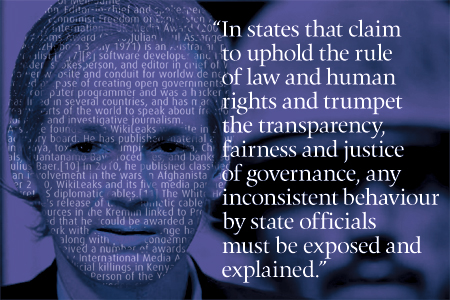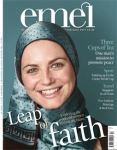
Much Ado About Nothing
Issue 77 February 2011
The latest WikiLeaks revelations are mainly the gossip and hearsay of diplomats.
In November 2010, the WikiLeaks “whistle-blowing” organisation began to publish 250,000 American diplomatic documents exchanged by US embassies around the world.According to the US Secretary of State’s hyperbole, WikiLeaks has compromised diplomatic efforts, jeopardised national security and put US lives at risk.
The world’s media excitedly published both the leaks and the official condemnations and attempts at damage control. Countless respondents to online newspaper articles still gush enthusiastically about America’s discomfiture, the importance of transparency and the dishonesty and double-talk of America’s allies.
In response to either governmental pressure or concern over the legality of WikiLeaks’ operations, various internet servers ceased hosting WikiLeaks and several financial organisations ended its bank transfer and online payment processes. Servers which continued to host WikiLeaks reportedly received cyber attacks, ostensibly from official agencies. In retaliation to these supposed acts of censorship, WikiLeaks supporters then launched temporarily successful computer attacks on organisations including Mastercard, PayPal and PostFinance.
Fascinated by this spiralling cyberwar, the media and the internet-savvy public have come to see this affair as almost as important as the leaked documents themselves; as a major battle over the lofty principles of truth, transparency and freedom. Even the alleged sex offenses of the WikiLeaks founder, Julian Assange, have filled headlines and become politicised, with supporters (including politicians and celebrities) dismissing them as politically motivated attempts to silence Assange.
Strangely, given the brouhaha, the leaked diplomatic cables do not actually reveal much at all, at least not much of reliable provenance. Few of the documents (only six percent or so) were ever sensitive enough to have been classified as “secret” and none had higher security classifications. All the rest were either “confidential” or “unclassified”. In other words, taken as a whole the documents were fairly routine and uncontroversial.
They nonetheless include a few truly troubling and inexplicable revelations such as the eavesdropping of UN Secretary General Kofi Annan by western diplomats in the weeks before the invasion of Iraq in 2003 and the later US State Department instruction to US diplomats to spy on Kofi Annan’s successor, Ban Ki-moon. Likewise, at a time when American, British and other soldiers are dying in defense of Afghanistan’s supposedly democratic government, we learn from WikiLeaks that the Afghan Vice President was discovered in the UAE with $52 million in cash that he was allowed to retain without revealing the money’s origin, destination or purpose.
The world should know about irregular, duplicitous or corrupt behaviour of this magnitude. If these allegations prove to be true (and that’s not yet the case), WikiLeaks has performed a tremendous service. In states that claim to uphold the rule of law and human rights and trumpet the transparency, fairness and justice of governance, any inconsistent behaviour by state officials must be exposed and explained.
Yet most of the WikiLeaks revelations published since November are nothing more than tittle-tattle and hearsay by ambassadors and other diplomats who are quoting their dinner guests or counterparts in meetings. We find Saudi and other Arab officials, as well as Chinese and other Asian officials, telling American diplomats whatever they want to hear about America’s nations of concern: Iran and North Korea. Even if they believe what they are telling the Americans, their statements are hardly surprising. They would say those things. Their national interests and their protective maintenance of their relationships with the US make their supportive statements to US officials inevitable.
It is surprising and disappointing that this tittle-tattle gained far more media coverage than the aforementioned allegations of very significant impropriety. Actually, most surprising is how easily and immediately the November 2010 WikiLeaks allegations overshadowed the far more important WikiLeaks release four months earlier of 92,000 documents relating to the war in Afghanistan between 2004 and 2009. I cannot condone the leaking of any current military documents, because it genuinely can cost lives, yet it is hard to understand why revelations about Muammar Gaddafi’s “voluptuous blonde” nurse, the claim by the Crown Prince of Abu Dhabi that Iranian President Ahmadinejad was the new Hitler, and so forth, managed so quickly to take the media’s and the public’s eyes off the earlier WikiLeaks releases about a war that sadly continues to claim the lives of British soldiers and many innocent people. I am not for a minute suggesting that those July 2010 WikiLeaks documents prove that our military personnel have acted improperly - indeed, I believe the troops themselves serve honourably - but we should care more about their experiences and the strategy they follow than about the personal opinions and foibles of Middle Eastern and other leaders as quoted by US diplomats.
Dr Joel Hayward holds various senior academic posts, including Dean of the Royal Air Force College, and is an author and poet. These are his personal views only.
Bookmark this |
|
Add to DIGG |
|
Add to del.icio.us |
|
Stumble this |
|
Share on Facebook |
|
Share this |
|
Send to a Friend |
|
Link to this |
|
Printer Friendly |
|
Print in plain text |
|


Comments
0 Comments